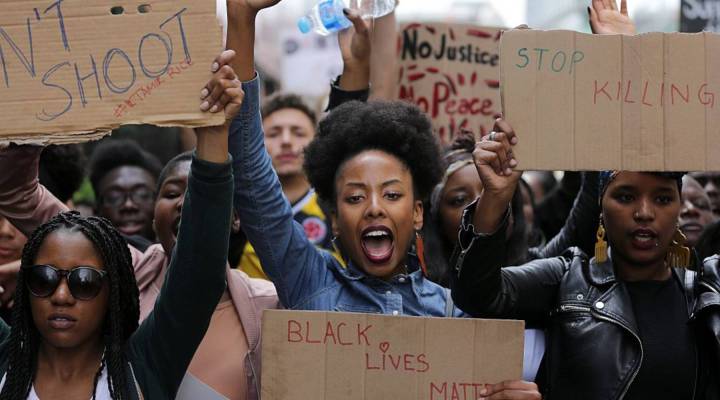
Black Twitter is a force for activism

Twitter has the power to shape global conversation. And it’s become a way for marginalized communities to garner attention for the issues that matter to them. Case in point: Black Twitter.
According to Pew Research, young black Americans use Twitter more than any other platform. And they’re discussing topics like racial injustice, police shootings, and representation in entertainment.
Marketplace Tech host Molly Wood spoke with the author and activist known as Feminista Jones about the cultural significance and influence of Twitter as a platform for black activism. The following is an edited transcript of their conversation. They began by talking about the role Black Twitter played before and during the trial of George Zimmerman, who shot and killed 17-year-old Trayvon Martin.
Feminista Jones: The juror from that case was going to write a book. Her book got canceled because Black Twitter wasn’t having it. You could even look on the other side, the positive side of light entertainment and looking at how your prime-time lineups have changed based on Black Twitter’s engagement. So now you’re seeing more black women, for example, in prime time shows. You’re seeing more movies coming out that are featuring black women because black women really drive Black Twitter. But it’s clear to people that are brands and companies that Black Twitter is powerful and will spread their message one way or another.
Molly Wood: When you talk about that dynamic and how it works, does that dynamic literally come down to invisible versus visible?
Feminista Jones: Yeah, I think that’s part of it, and I think what Twitter has allowed is for voices that have long been marginalized and silenced to actually be centered and be put at the forefront. People who are just walking down the street living their own lives, they send a tweet. Next thing you know, they’re hyper visible and thousands of people have read an article and seen their avatar. But I also think that it’s been a really powerful tool for those who have long been organizers, long been community activists, long been writers and producers and all these kinds of things to finally be seen and heard in a space that everyone in the world is watching. People are tapping into Black Twitter to see what the next cultural trend is going to be.
Wood: To what extent — I mean, it feels like that is translating into representation in some really obvious and powerful ways. Like “Black Panther” alone. You know, once you get sort of Hollywood comfortable with this idea that there will be a market, for example, how does that translate into something that could lead to real and lasting change in this country?
Feminista Jones: For me, I’m a little bit cynical, maybe because I’m older and I’ve seen these kinds of things happen before, but we’ve shown that we do show up. So hopefully Hollywood takes note. But again, when you’re looking at the number of women who are even in Hollywood as directors, writers and producers, those numbers are still extremely low. When you look at the people of color that are in there, those numbers are still extremely low. So in terms of accessing the mainstream and what effect this is going to have, I think it will have some. I think it’s going to be slow growing. Because you can’t deny it. It’s out there. The discrimination is out there, and the people fighting the discrimination are out there, so you can’t really deny it. But we’re still not seeing a whole lot of change.
Wood: So let’s talk a little bit more then about the downsides and dangers. People bringing up topics specifically to inflame Black Twitter, and then, of course, there are bots. We learned recently that there were sort of a host of bots created to impersonate people who were posting as part of Black Twitter. Do you worry about the community and the conversation being corrupted?
Feminista Jones: I think that that’s a very real concern. But at the same time, it’s like we all understand that we are having public conversations that anyone can access. But I think that any time you gather in a space, you’re going to see attempts at infiltration, and this dates back to the 1820s when they enacted laws that black people could not gather without a white person being present because they were afraid of rebellions. And so Black Twitter is definitely ripe for that. We have been plotting things. We have been organizing. So I see why they’re concerned, but at the same time, we’ve got to do what we need to do for ourselves, and Black Twitter is the most powerful tool we have to be able to organize.
Listen to our extended interview with the author and activist known as Feminista Jones here.
There’s a lot happening in the world. Through it all, Marketplace is here for you.
You rely on Marketplace to break down the world’s events and tell you how it affects you in a fact-based, approachable way. We rely on your financial support to keep making that possible.
Your donation today powers the independent journalism that you rely on. For just $5/month, you can help sustain Marketplace so we can keep reporting on the things that matter to you.


















